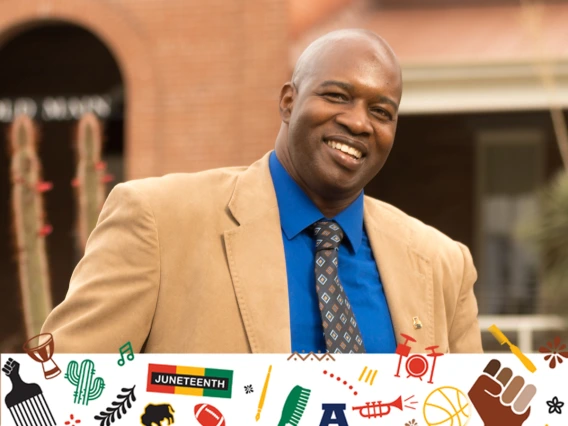
In celebration of Black History Month, the College of Humanities is spotlighting faculty, staff, students and alumni. This week, meet Shaun Brown, who graduated from the University of Arizona in 2005 with a minor in Africana Studies, a major in Geography, and went onto earn a master’s degree in Planning. Today, he works as a facilities assessor for the Arizona Department of Administration, covering land use patterns, community planning, rezoning, legal descriptions, and population trends.
“Black History Month means learning ‘American’ culture and history that some Americans have never known. Black History tells me a story about my ancestors and what historical value they brought from Africa to the Americas. Black history brings the rich history of my community, and to have pride as a Black man for myself and others who opened the doors for me even to be able to tell this story,” he says.
“It’s very important for universities, as well as K-12 public institutions, and private and charter schools, to teach Black History Month. We have been taught ‘American History,’ but from one point of view and perspective, not including the other ethnicities and their history as well as the cultures they developed or brought to the United States. It helps students, parents, guardians, children, staff, and the surrounding communities understand one another’s values and customs not based on preconceived stigmas of cultures, races, or groups mispresented in social media or at home.”
Brown says his program in Africana Studies aided in enriching his historical knowledge, critical thinking, and gaining important perspectives on culture and diversity.
“The opportunities for underrepresented students on campus are excellent. There are more opportunities to learn about their heritage than I and other people before me had. Courses at the College of Humanities and other colleges are great resources. The student must take the time and willingness to know about their culture and others to have pride and self-love.”
In a broader context, Brown says learning about local and regional Black history provides connections to history elsewhere, as well as modern times.
“You can learn about the history of the Buffalo Soldiers, who were Americans' first line of defense locally. These black women and men ventured West for work due to limited opportunities in the South for African Americans after slavery. History has a way of repeating itself; we must take the time to understand and learn from it to prosper as people. People around the world are learning more about the African diaspora and that all Black people around the world are connected in some way due to slavery or the injustice Black people face day to day.
“Just think about the George Floyd coverage and the many people worldwide supporting the injustice that occurred to this Black man who was a father, uncle, husband, son, brother, friend, and mentor to people within his community. He wasn't perfect, but that does not mean Floyd had to lose his life either. Many other people of color worldwide can relate to the pain and suffering Floyd, his family, and friends endured almost three years ago. These two topics are essential to learning about Black History Month. Not just once a year, but 365 days, no matter what month, Black History will always be relevant.”

